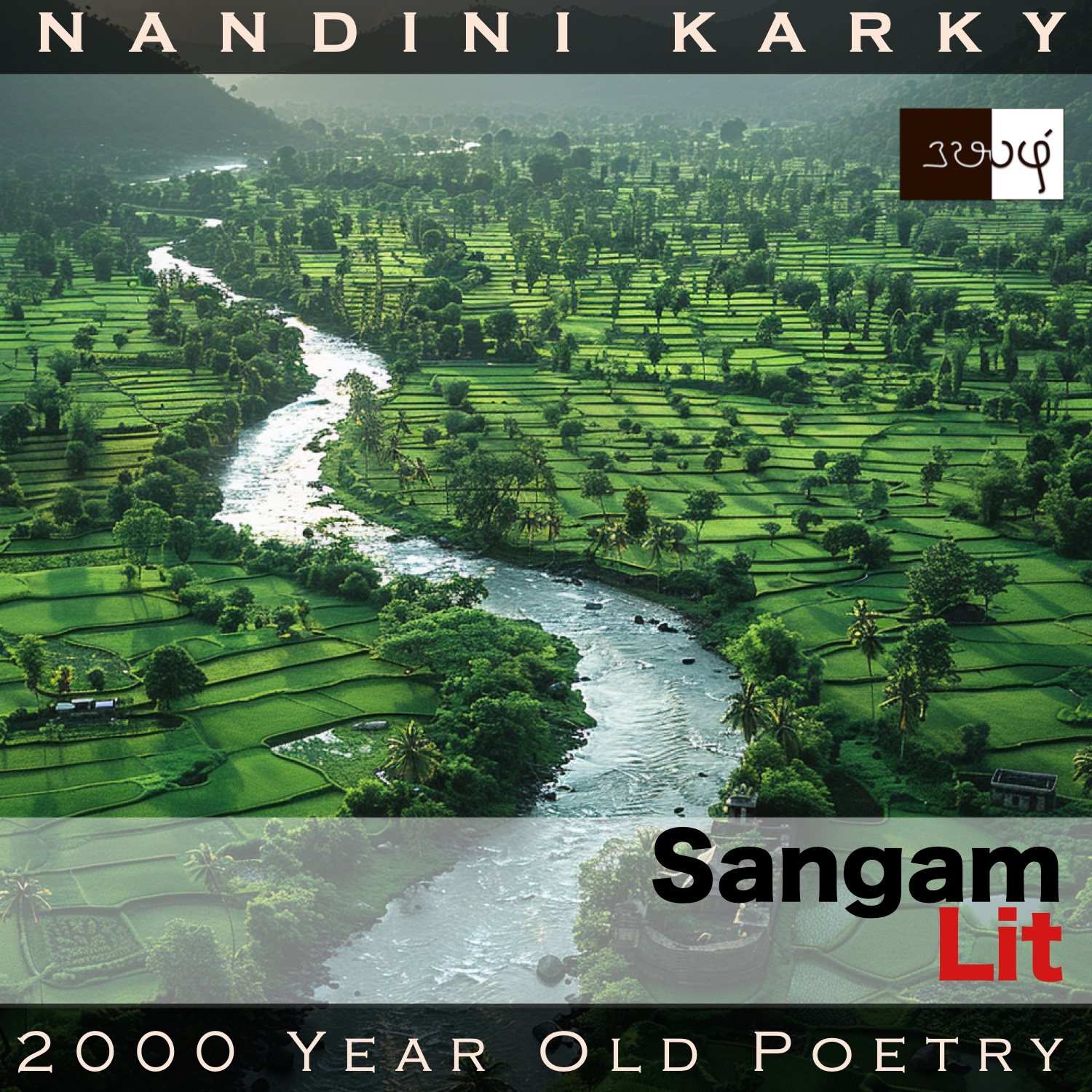Podcast: Play in new window | Download
Subscribe: Apple Podcasts | Spotify | Amazon Music | Android | iHeartRadio | TuneIn | RSS | More
In this episode, we listen to the glory of a king in war and compassion, as portrayed in Sangam Literary work, Puranaanooru 387, penned about the Chera King Selvakadungo Vaazhiyaathan by the poet Kundrukatpaaliyaathanaar. The verse is situated in the category of ‘Paadaan Thinai’ or ‘Praise’ and renders a heartfelt blessing upon this ruler.

வள் உகிர வயல் ஆமை
வெள் அகடு கண்டன்ன,
வீங்கு விசிப் புதுப் போர்வைத்
தெண் கண் மாக் கிணை இயக்கி, ‘என்றும்
மாறு கொண்டோர் மதில் இடறி,
நீறு ஆடிய நறுங் கவுள,
பூம் பொறிப் பணை எருத்தின,
வேறு வேறு பரந்து இயங்கி,
வேந்துடை மிளை அயல் பரக்கும்
ஏந்து கோட்டு இரும் பிணர்த் தடக் கை,
திருந்து தொழில் பல பகடு
பகைப் புல மன்னர் பணிதிறை தந்து, நின்
நகைப் புலவாணர் நல்குரவு அகற்றி,
மிகப் பொலியர், தன் சேவடி அத்தை!’ என்று,
யான் இசைப்பின், நனி நன்று எனா,
பல பிற வாழ்த்த இருந்தோர் தன் கோன்……
மருவ இன்நகர் அகன் கடைத்தலைத்
திருந்து கழல் சேவடி குறுகல் வேண்டி,
வென்று இரங்கும் விறல் முரசினோன்,
என் சிறுமையின் இழித்து நோக்கான்,
தன் பெருமையின் தகவு நோக்கி,
குன்று உறழ்ந்த களிறு என்கோ?
கொய் உளைய மா என்கோ?
மன்று நிறையும் நிரை என்கோ?
மனைக் களமரொடு களம் என்கோ?
ஆங்கு அவை, கனவு என மருள, வல்லே, நனவின்
நல்கியோனே, நசைசால் தோன்றல்,
ஊழி வாழி, பூழியர் பெரு மகன்!
பிணர் மருப்பு யானைச் செரு மிகு நோன் தாள்
செல்வக் கடுங்கோ வாழியாதன்
ஒன்னாத் தெவ்வர் உயர்குடை பணித்து இவண்
விடுவர் மாதோ, நெடிதோ நில்லாப்
புல் இலை வஞ்சிப் புற மதில் அலைக்கும்
கல்லென் பொருநை மணலினும், ஆங்கண்
பல் ஊர் சுற்றிய கழனி
எல்லாம் விளையும் நெல்லினும் பலவே.
A long song of praise extolling the greatness of this much-celebrated Chera King. The poet’s words can be translated as follows:
“Like the white underbelly of the sharp-clawed field turtle, appears the spread-out, well-tied new skin of the clear-eyed, huge Kinai drum. Playing on this drum, I sang, ‘The one who always shatters walls of enemies, with elephants, which are known to work with expertise, having fragrant foreheads coated with mud, thick necks covered with fine spots, upraised tusks, thick and rough long arm, by making them spread in different directions in the forests of the foes; The one, who receives taxes, handed over subserviently by kings of enemy lands, and removes the suffering of poets who are dear to him; May his feet shine with glory forever’. Hearing this, saying ‘That’s very good’, many others praised too.
There, stood the great king at the imposing entrance of his palace. He beckoned me to come near his fine feet clad with well-etched warrior anklets, that king with a strong drum that always resounds with victory. Without looking down upon the inferiority of my state, he saw me from the superiority of his stature. Should I talk about the hill-like elephants? Or the horses with clipped manes? Or the cattle that filled the common space? Or the fields and field workers? Right there, confusing me as if it was a dream, promptly he rendered all this, in reality, that affectionate scion! May he live long, the great lord of Poozhiyar! The one who has elephants with fine tusks and efforts that always end in victory, King Selva Kadungo Vaazhiyaathan. Hearing his name, even enemies bend their tall umbrellas, and without prolonging for long, offer all manner of respect to him. And so, more than the sand on the shores of the uproarious Porunai that caresses the boundary walls of the leafless Vanji, and more than the paddy that grows in all the fields in the many towns around, may he live on!”
Time to explore the details. The poet starts with a striking simile, equating the underside of a turtle that lives in paddy fields and the new, stretched-out skin on his ‘Kinai’ drum. Upon some research, understood that this turtle could be the ‘Indian Flapshell Turtle’, for this lives near river streams and irrigation channels. Seeing a picture of this turtle’s other side, I was convinced that this is exactly what our poet is talking about. Returning, we find the poet saying how he was drumming on the eye of the Kinai drum that looks like the turtle’s belly, and singing about the way the king defeats his enemies with his sturdy, fierce battle elephants. He also sang about how the king takes the taxes of these enemies and ends the poverty of the poets and supplicants who come to him. When others assembled at the king’s court heard these praises, they too declared that it was true and good. Just then, the king himself appeared with warrior anklets glowing on his feet and he beckoned the poet, not minding his shabby appearance and lowly state, for he saw him from the height of his stature, the poet explains.
Then, the poet talks in excitement about the elephants, horses, cattle and fields given along with field workers. All this was showered upon the poet, making him wonder if it was a dream. Then, he declares with conviction that the king has offered all this in reality indeed. He goes on to praise the king once again saying how his very name makes even enemies bow down with respect and how the king’s drums forever resound with victory. The poet wishes that the king lives on for more days than the sand on the shores of the Porunai river that encircles the boundary walls of the great city of Vanji, referred to as ‘leafless Vanji’ to differentiate the city from the tree with the same name. Not only that, he must live for more days than all the paddy in all the fields in all the towns around this rich river, the poet concludes. That is an astronomical number of days, no doubt! A verse which praises a king, celebrating his victory in war and his generosity in peace, and with that unique blessing, not only shows the regard the poet held for the king, but also underscores the harvest of prosperity born from the fertility of ancient rivers!




Share your thoughts...